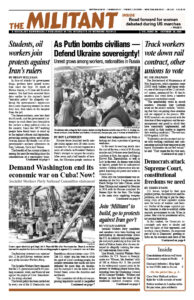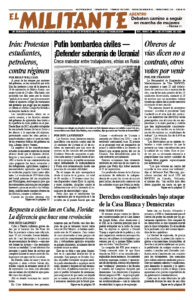AUCKLAND, New Zealand — “The regroupment of our forces in Sydney qualitatively changes the prospects for the Communist League to go forward in the Pacific region,” said Mike Tucker, a longtime leader and organizer of the Communist League in New Zealand, speaking here Sept. 24.
“Consolidating in one CL will enable us to better respond to the growing resistance to capitalism’s worldwide crisis, participate more effectively in the class struggle and recruit.”
Tucker was addressing a public meeting to explain and celebrate the decision of the Communist Leagues in Australia and New Zealand to consolidate and build a stronger, combined CL in Sydney, Australia. A similar meeting was held in Australia in July.
Thirty-five people — members, supporters and others from Australia and New Zealand — attended the meeting and send-off for comrades in New Zealand on their way to join with the CL in Australia. The panel of speakers included leaders of the CL in the Pacific, as well as representatives from the leaderships of the Communist Leagues in Canada and the United Kingdom, and the Socialist Workers Party in the U.S.
A collection at the meeting registered the enthusiastic response of participants, raising over NZ$6,000 (US$3,360). A lively social and dinner followed.
The meeting was co-chaired by Communist League members Janet Roth and Baskaran Appu. Roth read a number of messages wishing the strengthened League well and reported on the well-received donations of books from the League’s book center to prison and other libraries.
Tucker told the audience that he had been one of those, predominantly teenagers, who at the end of the 1960s formed a party that became the Communist League in New Zealand. “We were inspired by the example of Cuba’s workers and farmers and the socialist revolution they were carrying out.”
“As we acted to build and lead a mass movement against the imperialist military invasion of Vietnam,” Tucker said, “we had to take on a reformist Labour Party in Parliament, and long-time reactionary Stalinist parties aligned to Beijing and Moscow, and their class-collaborationist politics.”
“We met the Socialist Workers Party in the U.S., and other communists from around the world. Through collaboration with them we began to draw on revolutionary working-class continuity, from Cuba’s socialist revolution, led by Fidel Castro, and reaching back to Lenin, Trotsky, the Bolsheviks and to Marx and Engels.
“At the end of the 1970s, we joined with our world movement to organize our party’s members, and leaders, into industrial jobs and the unions. In New Zealand this included the powerful meat workers’ unions.” We built a proletarian party, multinational and internationalist, he said.
“This turn coincided with the revolution in Iran, which overthrew the shah in 1979, and the coming to power of workers and farmers governments in Grenada and Nicaragua. We reached out to these revolutions and also to struggles across the Pacific in Fiji, Vanuatu, New Caledonia, the Philippines and elsewhere.
“Through these and many other experiences, the leagues in Australia and New Zealand acted shoulder to shoulder to mutually strengthen their work.”
It is this internationalist perspective and continuity, which shaped our cadres and parties from the start, that we are building on today, he said.
The class struggle in Australia
Linda Harris, organizer of the Communist League in Australia, said, “As inflation grinds down on working people, we see a growing number of workers starting to fight for wage increases, shorter hours and to resist assaults on safety conditions. The low point of labor resistance we have lived through is behind us.
“Our party is part of these struggles, fighting for a course to use union power, to develop a class-struggle leadership, and to build a labor party based on the trade unions.
“This is the perspective we will put forward as we campaign in the New South Wales state elections next year,” she added, “including trips out to workers and farmers in the countryside.” Harris announced that she and Robert Aiken are standing as the Communist League candidates.
“In Sydney, just in the last few weeks, we’ve been able to get to union rallies organized by nurses and midwives and child care workers fighting for wages that keep up with inflation and for better staffing ratios,” she said. “And there are many fights that we haven’t been able to get to.”
“A stronger CL in Sydney opens up the possibilities of responding to developments in our class like these, and to respond to politics not only in Australia but in the broader region, from Sri Lanka, to Indonesia to the Philippines. We have been too stretched to do so.”
International greetings
Harris read from a message to the meeting from Ron Poulsen, a founding leader of the Communist League in Australia:
“I wanted to add my voice from afar to your discussion and celebration of the momentous decision by comrades in the Communist Leagues to strengthen our forces in the Pacific by regrouping in Sydney, adding powerfully to the Communist League there, and to our international movement’s work in the region.”
Since World War II, “Canberra, the dominant imperialist power in the southwest Pacific, has been Washington’s main regional ally.
“This is the weighty objective reason, along with the size of the working class there, for consolidating in Australia,” Poulsen wrote. “Based in Sydney, a combined Communist League is stronger and better positioned to reach out to working-class struggles across the continent and to the huge part of humanity to the north, west and east, including in New Zealand.”
The war in Ukraine, the first land war between major capitalist powers in Europe in 75 years, is a brutal manifestation of big changes and alignments in the post-WWII world order put together by U.S. imperialism, Steve Penner, organizer of the Communist League in Canada, told the meeting.
“Putin’s invading forces are breaking their teeth on the courageous resistance of Ukraine’s working people and armed forces,” he said. “Since the invasion began seven months ago our world movement has campaigned far and wide to defend Ukraine’s independence and for Russian troops out of Ukraine.
“The Communist League in Canada salutes your decision. It’s an important and necessary step in building the kind of proletarian party in the Pacific region that is rooted in the continuity of the international communist movement. A party with the goal of taking political power out of the hands of the capitalist warmakers and putting it in the hands of working people.”
Jonathan Silberman, a long-time leader of the Communist League in the United Kingdom, recalled how a number of party leaders in Sweden in 2011 and Iceland in 2007 moved to London to help build the League there.
The strengthened party has been able to boost its work across the U.K. and Ireland, as well as in Europe, the Middle East and further afield, he said.
It has recruited new cadre and begun to “take advantage of renewed openings to be part of trade union struggles against the working conditions and wages imposed by the bosses.”
Dave Prince, speaking for the National Committee of the Socialist Workers Party in the U.S., told the gathering, “This decision by the comrades in the Pacific is a bold step.”
He stressed that working people in the U.S. and other imperialist countries face an offensive — often spearheaded by the “left” — against constitutional rights of assembly, free speech and more. “Opposing this assault is at the center of the class struggle in the U.S. today,” he said.
“Cuba’s socialist revolution and communist continuity are a powerful example for working people today,” Prince noted. Revolutionaries, he added, should not ask, “How is Cuba doing?” a question sometimes raised by Cuba’s friends who have gone wobbly. Instead, we ask and answer, “How are we doing? How are we doing in building a proletarian party that can emulate the course carried out by Cuba’s workers and farmers under Fidel’s leadership?
“Engaging the big political questions, making the decisions that enable us to do that, as the comrades are doing here, as we are doing in the U.S., Canada, and the U.K. is decisive,” he said. “We welcome this occasion to celebrate these steps together.”


